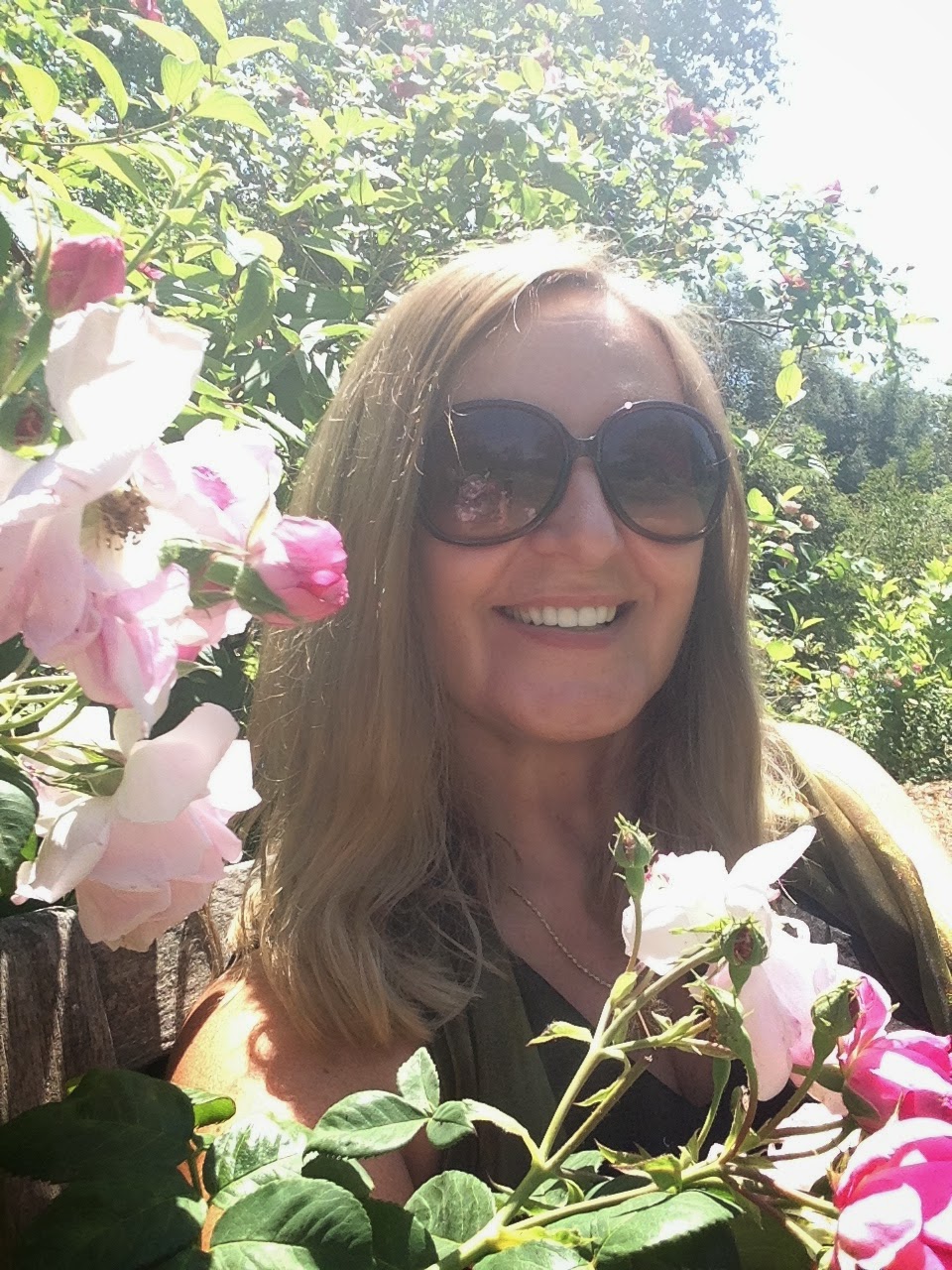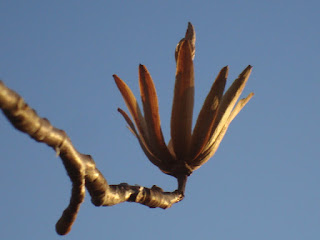In poetry - I was fascinated by bilingual edition of Apollinaire, a French poet of Polish descent. My mom had this book with strange experimental poems, letters scattered across the page, streaming down like droplets of rain. Amazing! Guillaume Apollinaire (1880-1918) was a French poet and playwright of Polish descent, born Wilhelm Albert Włodzimierz Apolinary Kostrowicki. He wrote one of the earliest surrealist plays, The Breasts of Tiresias, was founded in WWI and died in the Spanish flu pandemic.
I'm not dead yet, so there's hope I'll become a better Polish-language poet in time. It is a challenge to render one language in another in prose. Poetry is much harder because the melody and rhythm of the language has to be taken into account, not just the meaning. My first poems that were published in Polish, in an anthology by the Krak Art Group, were translated by others, Konrad Wilk and Liliana Wilk. I translated my own poems for some other publications, such as Poezja Dzisiaj, in Poland - for a set of emigre poetry edited by Anna Maria Mickiewicz of London. It is really as hard as pulling teeth for me. What I decided to do was to adapt and paraphrase, keeping the overall meaning and making sure that the Polish-language poem actually sounds like a poem and not a complete mess.
Here are some results.
MEMENTO VITAE
Pomówmy o śmierci.
Twój ostatni oddech
To koniec – a może nie?
Nie wiesz nic.
Mówmy o ostatnim
Dniu. Co byś zrobił
Gdybyś wiedział?
Kogo byś kochał?
Czy szukałbyś swej najmilszej,
Najgłębszej miłości?
A może byś został wśród bliskich
Których dobrze znasz?
Czy okradłbyśkogoś,
Obrabował, obraził?
Czy zacząłbyś rozpaczać?
Wrzucił listy w ogień?
Gdyby kanwa twej przyszłości
Znikła? I zostałby ci tylko
Dzień? Lub godzina?
Mówmy więc o życiu.
Każdy oddech niesie cię
W taniec minut, sekund.
W rytm serca.
Właśnie tak.
© 2008 by Maja Trochimczyk
MEMENTO VITAE
Let's talk about dying.
The gasp of last breath.
The end. Or maybe not,
We don't know.
Let's talk about the last day.
What would you do
if you knew?
Whom would you love?
Would you find your dearest,
most mysterious love?
Or would you just stay
in the circle of your own?
Would you rob, steal
or insult anyone?
Would you cry?
Burn your papers?
If the fabric of your future
shrank to one day,
or maybe just an hour?
Let's talk about living, then.
The next breath,
that will take you
to the next minute,
the next heartbeat.
Just about – now.
© 2008 by Maja Trochimczyk
O SZCZĘŚCIU
W domu z witrażami czereśni
usłyszysz jak kot śpi, chrapiąc w komforcie
ręcznie haftowanej poduszki
W domu świeżo ściętych róż
poczujesz jak powietrze zakwita
słodyczą cynamonu i muszkatu
Poczujesz smak miłości
zmieszanej z kroplami deszczu
na patio w mym magicznym domu
Gdzie wszystko, czego dotkniesz,
zmienia się w czyste złoto
szczęścia, które tak dobrze pamiętasz
ON BLISS
In a house of stained-glass cherries
you can hear a cat sleep
snoring into the comfort
of his hand-embroidered pillow.
In a house of fresh-cut roses
you can feel the air bloom
with the sweetness
of cinnamon and nutmeg.
You can taste love
mixed with raindrops
on the patio of my magic house
where everything you touch
changes into pure gold
of bliss, perfectly remembered.
(C) 2006 by Maja Trochimczyk
DEFINICJA LITERATURY
Nie chodzi o rozdzielanie zapałki na czworo
Czy liczenie diabłów na okrągłej główce
To wszystko nieważne
Patrz: wschód słońca nad Szczytem Truskawek
I Górą Rozczarowań tańczy na puchatym
Tłuszczyku pierwszych obłoków lata
Zobacz: świetliste linie na płytkim strumieniu
W kanionie błyszczą jak łuski karpia
Czekającego na śmierć w wannie przed Wigilią
Słuchaj: stada wron rozsiadają się na noc
Kanciaste kształty pokrywają czernią gałęzie drzew
Jak klastery, ostre akordy Xenakisa
Widzisz? Wrony kąpią się w rzece, rozciągają
Skrzydła na betonowym nabrzeżu, woda kapie
Dużymi kroplami – one nieświadome, drzemią
Jak wytatuowane, spocone tłumy wakacjuszy
Na zapiaszczonych ręcznikach w Santa Monica ,
Czekające na tsunami, którego nie będzie
Właśnie to jest ważne: spójrz inaczej – nie na siebie
Lecz we wszechświat, nie – na przegrane ambicje
Lecz na miliony gwiazd w galaktykach
Kosmiczne kolizje, wybuchy supernowych
Tysiące niezamieszkałych planet –
Możemy je policzyć, nie możemy dotknąć
Możemy dotknąć, ale nie policzyć
Cieniutkie linie na płatku róży, wyschniętym
w upale pustyni, choć zakwitł dziś rano
Nie o nas tu chodzi – rozejrzyj się dalej
uchwyć co przeminęło, zatrzymaj ziarno czasu
w swej otwartej dłoni – tę iskierkę, chwilę
DEFINITION: WRITING
in response to George Jisho Robertson’s essay “Path of Poesis”
It is not like splitting the match in four
or counting devils on its round head –
none of this matters, really
see the sunrise above Strawberry Peak
and Mount Disappointment shimmer
on the puffy underbelly of summer clouds
be dazed by bright ripples on a shallow canyon stream
shining like scales of a carp waiting to be killed
in a bathtub before Polish Easter
listen to the roosting birds at dusk,
the murder of crows covering tree branches
with angular shapes, dense Xenakis chords,
black clusters, dissonant, intense. They bathe
in the river, sit on a concrete bank with wet wings
outstretched, drooping with water, docile
like tattooed crowds resting, sweating
on sandy beach towels in Santa Monica,
waiting for a tsunami that will not come
shifting the gaze is important, from the navel
to cosmos – not how we fail in a multitude of ways,
but what graces hide in galaxies
that collide amidst exploding supernovas,
on thousands of inhabitable planets
we’ll count but never touch –
we’ll touch but never count
the veins on the petals of the rose
shriveling from desert heat, just opened
Not us, then, look around, beyond,
catch what's already gone, hold it
in your hand - the spark, the passing
Maja Trochimczyk © 2012
ETIUDA Z CZERESNIAMI
A ja chcę czereśnie
Słodziutkie czereśnie
Chce poczuć ciemne nuty soku
Na mojej skórze
Jak krople deszczowego preludium
W mżawce poranka
W obłoku fortepianu
Wspinam się na czereśnię
Szukam ukojenia wśród kruchych gałęzi
Cieszę się doskonałością czerwieni
Czereśniową muzyką od samego rana
Nasycona, śpiąca
Chowam się w ciemnościach strychu
By łupać orzechy, obierać gorzką skórkę
Odsłaniać biały miąższ
Studium w tonacji C-dur
Smakuję marzenia
Akordy płyną przez szpary
Starych belek wypełnione światłem
To codzienny rytuał mojej babuni
Popołudnie z Chopinem
A STUDY WITH CHERRIES
After Etude in C Major, Op. 10, No. 1 and a cherry orchard of
my grandparents, Maria Anna and Stanislaw Wajszczuk
I want a cherry,
a rich, sweet cherry
to sprinkle its dark notes
on my skin, like rainy preludes
drizzling through the air.
Followed by the echoes
of the piano, I climb
a cherry tree to find rest
between fragile branches
and relish the red perfection -
morning cherry music.
Satiated, sleepy,
I hide in the dusty attic.
I crack open the shell
of a walnut to peel
the bitter skin off,
revealing white flesh -
a study in C Major.
Tasted in reverie,
the harmonies seep
through light-filled cracks
between weathered beams
in Grandma's daily ritual
of Chopin at noon.
(c) 2010 by Maja Trochimczyk
.JPG)
.JPG)











